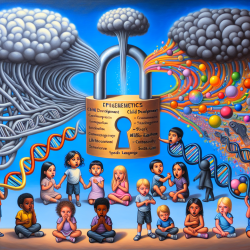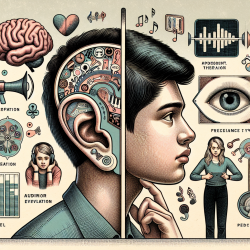Introduction
In the realm of child development, the influence of genetics has long been acknowledged. However, recent research sheds light on a fascinating dimension beyond DNA sequences: epigenetics. The study, "The Secret Language of Destiny: Stress Imprinting and Transgenerational Origins of Disease," explores how environmental factors like stress can imprint on our genetic makeup, influencing health and behavior across generations. This understanding opens new pathways for practitioners, especially those in speech language pathology, to enhance therapeutic outcomes for children.
Understanding Epigenetic Imprinting
Epigenetics involves changes in gene expression without altering the DNA sequence itself. These changes can be triggered by environmental factors, such as stress, and can be passed down to subsequent generations. This concept of transgenerational inheritance suggests that the experiences of parents and even grandparents can influence the health and development of children.
The study by Zucchi et al. (2012) highlights how adverse environmental conditions can create an "epigenetic memory," affecting disease predisposition and health outcomes in future generations. This memory can manifest in various ways, including increased susceptibility to psychiatric and metabolic disorders.
Implications for Practitioners
For practitioners in speech language pathology, understanding the role of epigenetics can be transformative. Here are a few ways to integrate these insights into practice:
- Holistic Assessment: Consider the family history and environmental factors that might contribute to a child's developmental challenges. This can provide a more comprehensive understanding of the child's needs.
- Targeted Interventions: Develop interventions that not only address current speech and language issues but also consider underlying stressors that may have epigenetic origins.
- Parental Involvement: Engage parents in the therapeutic process, educating them about the potential impact of stress and lifestyle on their child's development. Encourage stress-reducing activities and supportive environments at home.
- Continued Research: Encourage ongoing research and collaboration with geneticists to explore the potential for epigenetic therapies that could mitigate adverse effects and promote optimal development.
Future Directions
The potential for epigenetic interventions in personalized and preventive medicine is vast. By understanding the specific epigenetic markers that influence speech and language development, practitioners can tailor interventions to each child's unique genetic and environmental profile.
Moreover, this research underscores the importance of early intervention. By addressing environmental stressors early, we can potentially alter epigenetic trajectories, leading to improved outcomes not only for the child but for future generations.
Conclusion
Epigenetics offers a powerful lens through which to view child development. By integrating these insights into practice, speech language pathologists can enhance their therapeutic approaches, creating better outcomes for children and their families. As we continue to explore the interplay between genetics and environment, the potential to unlock new possibilities for children's futures becomes ever more promising.
To read the original research paper, please follow this link: The secret language of destiny: stress imprinting and transgenerational origins of disease.










